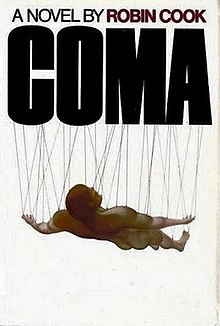Coma (novel)
 First edition cover | |
| Author | Robin Cook |
|---|---|
| Language | English |
| Genre | Thriller |
| Publisher | Little, Brown & Co. |
Publication date | 1977 |
| Publication place | United States |
| Media type | Print (Hardcover) |
| Pages | 306 |
| ISBN | 0-316-15510-1 |
| OCLC | 2829561 |
| 813/.5/4 | |
| LC Class | PZ4.C76992 Co PS3553.O5545 |
| Followed by | Sphinx |
Coma is Robin Cook's first major published novel, published by Signet Book in 1977.[1] Coma was preceded in 1973 by Cook's lesser known novel, The Year of the Intern (also published by Signet Book).[2]
Synopsis
Susan Wheeler is an attractive, 23-year-old third-year medical student working as a trainee at Boston Memorial Hospital. Susan, along with four other students—George, Harvey, Geoffrey, and Paul—takes rounds in surgery rooms and ICUs making post-treatment notations on the health of patients. Mark Bellows, a surgery resident in the hospital, is the instructor and supervisor of this group.
The book is a journey into the inner workings of a hospital. As these students complete their three-month surgical rotation, the dilemmas and problems faced by a woman in a so-called "man's" profession are also highlighted.
It comes to Susan's attention that two patients, Nancy Greenly and Sean Berman, mysteriously went into comas immediately after their operations. These incidents were attributed to complications due to anesthesia. Nancy Greenly became comatose when her brain did not receive sufficient oxygen during surgery. Similarly, Sean Berman, a young man in his 30s in good physical condition, underwent a scheduled knee operation. Despite the operation's success, Sean failed to regain consciousness. Medically, the odds for such occurrences are one in 100,000; however, such odds seemed resolutely higher at the Boston Memorial Hospital.
Baffled by these two patients, Susan decides to investigate the causes behind these peculiar events and of other recent coma victims. Susan discovers the oxygen line to Operating Room 8 has been tampered with to induce carbon monoxide poisoning in patients during surgery, ultimately causing brain death. At the same time Susan develops a brief, but intimate, relationship with Bellows and discusses her findings with him. After unraveling further details, and evading pursuit by a man hired to kill her, Susan is led to the Jefferson Institute.
The institute is hailed as an intensive care facility designed to cut down on heavy medical costs. Patients who are declared brain dead or "vegetables" are referred to the institute. Here, Susan finds that patients are suspended from the ceiling by wires in rooms walled by glass, and moved from room to room with little human involvement. The "samples" are kept alive and healthy until a call for an organ comes in. The organ of choice is removed surgically (without consent) and then sold on the black market.
Howard Stark, chief of the Department of Surgery at Boston Memorial, is revealed as the main antagonist. Stark confronts Susan over her findings and then drugs her, intending to put Susan in a coma under the pretext of an appendectomy. However, Bellows manages to disable the oxygen line during the operation, thereby preventing a full dose of carbon monoxide poisoning. Stark is arrested, but Susan's fate is left in doubt.
Background
Cook's first book had not sold particularly well so he studied the common ingredients of best sellers and felt that, for an unknown writer, mystery-thrillers had the best chance of success. He was particularly influenced by Jaws, Seven Days in May and the novels of Eric Ambler. His original publisher did not want it but Little Brown agreed to give him a $10,000 advance.[3]
Critical response
Coma literary awards and notations include being a New York Times best seller (reaching its highest position "Number 6" in the fiction category as reported October 6, 1977).[4] Coma was included in the Fiction category of "The New York Times Outstanding Book of the Year" listing (forerunner to The New York Times's current "100 Notable Books of [Year]" listing) from which the "Best Book of the Year" is selected. Though not an official award, Coma has been called 1977's "number one thriller of the year" by The New York Times Book Review.
Adaptations
The story was made into a highly successful film, Coma by Michael Crichton in 1978.
The story has been adapted again into a two-part television miniseries aired in September 2012 on A&E television network.[5]
Editions
- ISBN 0-451-21142-1 (2003)
- ISBN 0-451-20739-4 (2002)
- ISBN 0-606-01135-8 (1977)
- ISBN 0-330-25410-3 (paperback) (1978)
References
- ^ Cook, Robin (1977). Coma. Signet Book. ISBN 978-0451132963.
- ^ http://www.amazon.com/Year-Intern-Signet-Robin-Cook/dp/0451165551
- ^ BEHIND THE BEST SELLERS: Robin Cook By Judy Klemesrud. New York Times (1923-Current file) [New York, N.Y] 06 Nov 1977: BR15.
- ^ "The New York Times Best Seller List (Fiction)" (PDF). The New York Times. October 2, 1977. Retrieved July 16, 2012.
- ^ Munn, Patrick (June 14, 2012). "A&E Sets Premiere Date For Two Part Mini-Series 'Coma'". TV Wise. Retrieved July 16, 2012.
